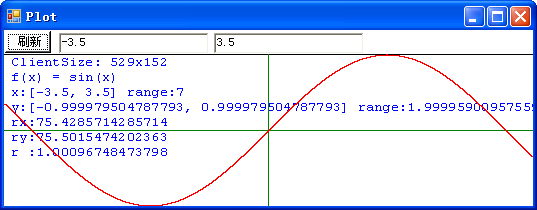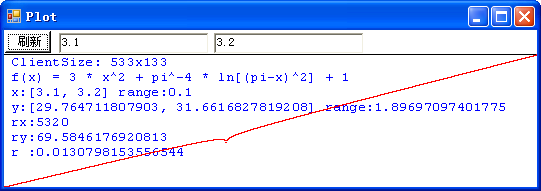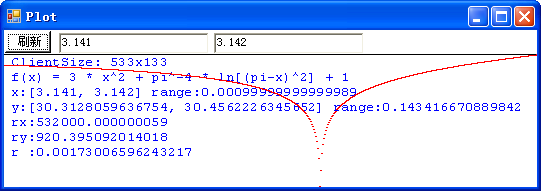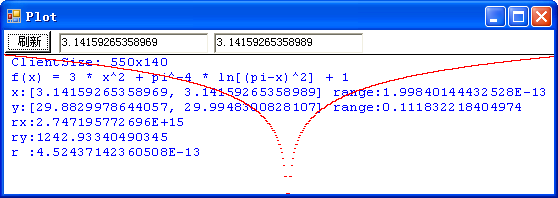该程序在屏幕上画出指定的函数的图像,函数的自变量的取值范围由用户指定,程序自动计算该区间内函数的值的取值范围。首先,让我们来看一幅正弦函数: f(x) = sin(x) 的图像:

这 幅图像中,ClientSize: 529x152 表示该程序画图区宽度为 529 个像素,高度为 152 个像素。该函数自变量 x 的取值范围从 -3.5 到 3.5,函数值 y 的取值范围应该是从 -1 到 1,但因为浮点数运算误差的关系,程序计算出来的是从 -0.999979504787793 到 0.999979504787793。接下来的 rx 表示函数自变量每单位值用多少个象素表示,ry 表示函数的值每单位值用多少个象素表示,r 值如果小于1表示图形纵向被压扁,反之则被拉伸。

这是抛物线的图像吗?不,这就是我们要讨论的病态函数: f(x) = 3 * x2 + π-4 * ln[(π-x)2] + 1 在 x 位于区间 [-10, 10] 之间的图像。程序计算出来的函数在这区间的取值范围是从 1.02350355338907 到 301.052885868965。r 值是 0.0165397334645646,表明该图像被极大地压扁,也就是,实际的图像要高得多。但是,由于这个函数是病态的,程序的计算实际上是错误的, 在该区间内,函数的最小值应该是负无穷大,并且,在 π - 10-667 到 π + 10-667 这一极小区间内方程 f(x) = 0 有两个实根。让我们在 π 值附近放大图像看一看:



这下看得比较清楚了吧!
实际上这个病态函数是《C数值算法(第二版)》第三章“内插法和外推法”中提到的:
---------------------------------------------------------------------------
可以很容易地构造一些病态函数使内插法失败。例如,考虑函数
f(x) = 3 * x2 + π-4 * ln[(π-x)2] + 1
它 除了 x = π 之外都有定义,而 x = π 时无定义,其它情况,值有正有负。而这函数在任何基于数值 x = 3.13, 3.14, 3.15, 3.16 的插值法,都肯定在 x = 3.1416 处得到一个错误的解,尽管通过这五个点所画的曲线确实相当平滑!(用计算器试试看。)
---------------------------------------------------------------------------
这个画函数图形的C#程序有一个严重的缺点,就是函数表达式是直接写的源程序中的,不能象SciLab和Matlab那样交互式地输入。不知道用 System.Reflection.Emit.ILGenerator 类能不能动态地生成用户输入的函数表达式?好了,下面就是该程序的源代码:
 // plot.cs: 画函数图形, 编译方法: csc /t:winexe plot.cs
// plot.cs: 画函数图形, 编译方法: csc /t:winexe plot.cs
 using System;
using System;
 using System.Drawing;
using System.Drawing;
 using System.Windows.Forms;
using System.Windows.Forms;

 namespace Skyiv.Ben.Plot
namespace Skyiv.Ben.Plot

 {
{
 sealed class PlotForm : Form
sealed class PlotForm : Form

 {
{
 // 要画的函数,如果能在 TextBox 中输入函数的表达式就更好了
// 要画的函数,如果能在 TextBox 中输入函数的表达式就更好了
 double Function(double x)
double Function(double x)

 {
{
 double u = Math.PI - x;
double u = Math.PI - x;
 double pi2 = Math.PI * Math.PI;
double pi2 = Math.PI * Math.PI;
 return 3 * x * x + Math.Log(u * u) / pi2 / pi2 + 1;
return 3 * x * x + Math.Log(u * u) / pi2 / pi2 + 1;
 }
}

 // 仅仅用来显示在屏幕上
// 仅仅用来显示在屏幕上
 string FunctionString()
string FunctionString()

 {
{
 return "f(x) = 3 * x^2 + pi^-4 * ln[(pi-x)^2] + 1";
return "f(x) = 3 * x^2 + pi^-4 * ln[(pi-x)^2] + 1";
 }
}

 const int yBase = 24; // 屏幕保留区域的高度
const int yBase = 24; // 屏幕保留区域的高度

 TextBox tbxX0, tbxX1; // 函数自变量的取值范围
TextBox tbxX0, tbxX1; // 函数自变量的取值范围

 PlotForm()
PlotForm()

 {
{
 SuspendLayout();
SuspendLayout();

 Button btnSubmit = new Button();
Button btnSubmit = new Button();
 btnSubmit.Text = "刷新";
btnSubmit.Text = "刷新";
 btnSubmit.Location = new Point(0, 0);
btnSubmit.Location = new Point(0, 0);
 btnSubmit.Size = new Size(48, 24);
btnSubmit.Size = new Size(48, 24);
 btnSubmit.Click += new EventHandler(BtnSubmit_Click);
btnSubmit.Click += new EventHandler(BtnSubmit_Click);

 tbxX0 = new TextBox();
tbxX0 = new TextBox();
 tbxX0.Text = "-10";
tbxX0.Text = "-10";
 tbxX0.Location = new Point(55, 3);
tbxX0.Location = new Point(55, 3);
 tbxX0.Size = new Size(150, 20);
tbxX0.Size = new Size(150, 20);

 tbxX1 = new TextBox();
tbxX1 = new TextBox();
 tbxX1.Text = "10";
tbxX1.Text = "10";
 tbxX1.Location = new Point(210, 3);
tbxX1.Location = new Point(210, 3);
 tbxX1.Size = new Size(150, 20);
tbxX1.Size = new Size(150, 20);


 Controls.AddRange(new Control[]{btnSubmit, tbxX0, tbxX1});
Controls.AddRange(new Control[]{btnSubmit, tbxX0, tbxX1});
 Text = "Plot";
Text = "Plot";
 BackColor = Color.White;
BackColor = Color.White;
 ClientSize = new Size(600, 600 + yBase);
ClientSize = new Size(600, 600 + yBase);
 // WindowState = FormWindowState.Maximized;
// WindowState = FormWindowState.Maximized;

 ResumeLayout(false);
ResumeLayout(false);
 }
}

 void BtnSubmit_Click(object sender, EventArgs e)
void BtnSubmit_Click(object sender, EventArgs e)

 {
{
 Invalidate();
Invalidate();
 }
}

 protected override void OnSizeChanged(EventArgs e)
protected override void OnSizeChanged(EventArgs e)

 {
{
 Invalidate();
Invalidate();
 base.OnSizeChanged(e);
base.OnSizeChanged(e);
 }
}

 protected override void OnPaint(PaintEventArgs e)
protected override void OnPaint(PaintEventArgs e)

 {
{
 double x0 = double.Parse(tbxX0.Text);
double x0 = double.Parse(tbxX0.Text);
 double x1 = double.Parse(tbxX1.Text);
double x1 = double.Parse(tbxX1.Text);
 Graphics gc = e.Graphics;
Graphics gc = e.Graphics;
 Size size = ClientSize;
Size size = ClientSize;
 int i0 = 0;
int i0 = 0;
 int i1 = size.Width - 1;
int i1 = size.Width - 1;
 int j0 = yBase;
int j0 = yBase;
 int j1 = size.Height - 1;
int j1 = size.Height - 1;
 Pen pen = new Pen(Color.Black, 1);
Pen pen = new Pen(Color.Black, 1);
 gc.DrawLine(pen, i0, j0, i1, j0); // 画图区和保留区的分界线
gc.DrawLine(pen, i0, j0, i1, j0); // 画图区和保留区的分界线
 double rx = (x1 - x0) / (i1 - i0);
double rx = (x1 - x0) / (i1 - i0);
 double y0, y1;
double y0, y1;
 GetFunctionValueRange(x0, rx, i0, i1, out y0, out y1);
GetFunctionValueRange(x0, rx, i0, i1, out y0, out y1);
 double ry = (y1 - y0) / (j1 - j0);
double ry = (y1 - y0) / (j1 - j0);
 Out(gc, 0, "ClientSize: {0}x{1}", i1 - i0 + 1, j1 - j0 + 1);
Out(gc, 0, "ClientSize: {0}x{1}", i1 - i0 + 1, j1 - j0 + 1);
 Out(gc, 1, FunctionString());
Out(gc, 1, FunctionString());
 Out(gc, 2, "x:[{0}, {1}] range:{2}", x0, x1, x1 - x0);
Out(gc, 2, "x:[{0}, {1}] range:{2}", x0, x1, x1 - x0);
 Out(gc, 3, "y:[{0}, {1}] range:{2}", y0, y1, y1 - y0);
Out(gc, 3, "y:[{0}, {1}] range:{2}", y0, y1, y1 - y0);
 Out(gc, 4, "rx:{0}", 1 / rx); // 函数自变量每单位值用多少个象素表示
Out(gc, 4, "rx:{0}", 1 / rx); // 函数自变量每单位值用多少个象素表示
 Out(gc, 5, "ry:{0}", 1 / ry); // 函数的值每单位值用多少个象素表示
Out(gc, 5, "ry:{0}", 1 / ry); // 函数的值每单位值用多少个象素表示
 Out(gc, 6, "r :{0}", rx / ry); // 该值如果小于1表示图形纵向被压扁,反之则被拉伸
Out(gc, 6, "r :{0}", rx / ry); // 该值如果小于1表示图形纵向被压扁,反之则被拉伸
 pen.Color = Color.Green;
pen.Color = Color.Green;
 int j = j1 + (int)(y0 / ry);
int j = j1 + (int)(y0 / ry);
 if (j >= j0 && j <= j1) gc.DrawLine(pen, i0, j, i1, j); // x坐标轴
if (j >= j0 && j <= j1) gc.DrawLine(pen, i0, j, i1, j); // x坐标轴
 int i = i0 - (int)(x0 / rx);
int i = i0 - (int)(x0 / rx);
 if (i >= i0 && i <= i1) gc.DrawLine(pen, i, j0, i, j1); // y坐标轴
if (i >= i0 && i <= i1) gc.DrawLine(pen, i, j0, i, j1); // y坐标轴
 pen.Color = Color.Red;
pen.Color = Color.Red;
 for (i = i0; i <= i1; i++)
for (i = i0; i <= i1; i++)

 {
{
 double x = x0 + (i - i0) * rx;
double x = x0 + (i - i0) * rx;
 double y = Function(x);
double y = Function(x);
 if (double.IsInfinity(y) || double.IsNaN(y)) continue;
if (double.IsInfinity(y) || double.IsNaN(y)) continue;
 j = j1 - (int)((y - y0) / ry);
j = j1 - (int)((y - y0) / ry);
 if (j > j1 || j < j0) continue;
if (j > j1 || j < j0) continue;
 gc.DrawLine(pen, i, j, i + 1, j); // 画函数的图形
gc.DrawLine(pen, i, j, i + 1, j); // 画函数的图形
 }
}
 base.OnPaint(e);
base.OnPaint(e);
 }
}

 // 函数值的取值范围
// 函数值的取值范围
 void GetFunctionValueRange(double x0, double rx, int i0, int i1, out double y0, out double y1)
void GetFunctionValueRange(double x0, double rx, int i0, int i1, out double y0, out double y1)

 {
{
 y0 = double.MaxValue;
y0 = double.MaxValue;
 y1 = double.MinValue;
y1 = double.MinValue;
 for (int i = i0; i <= i1; i++)
for (int i = i0; i <= i1; i++)

 {
{
 double x = x0 + (i - i0) * rx;
double x = x0 + (i - i0) * rx;
 double y = Function(x);
double y = Function(x);
 if (double.IsInfinity(y) || double.IsNaN(y)) continue;
if (double.IsInfinity(y) || double.IsNaN(y)) continue;
 if (y0 > y) y0 = y;
if (y0 > y) y0 = y;
 if (y1 < y) y1 = y;
if (y1 < y) y1 = y;
 }
}
 }
}

 // 在指定的位置写字符串
// 在指定的位置写字符串
 void Out(Graphics gc, int line, string fmt, params object [] args)
void Out(Graphics gc, int line, string fmt, params object [] args)

 {
{
 gc.DrawString(string.Format(fmt, args), new Font("Courier New", 10), Brushes.Blue, new PointF(5, yBase + 15 * line));
gc.DrawString(string.Format(fmt, args), new Font("Courier New", 10), Brushes.Blue, new PointF(5, yBase + 15 * line));
 }
}

 static void Main()
static void Main()

 {
{
 Application.Run(new PlotForm());
Application.Run(new PlotForm());
 }
}
 }
}
 }
}









